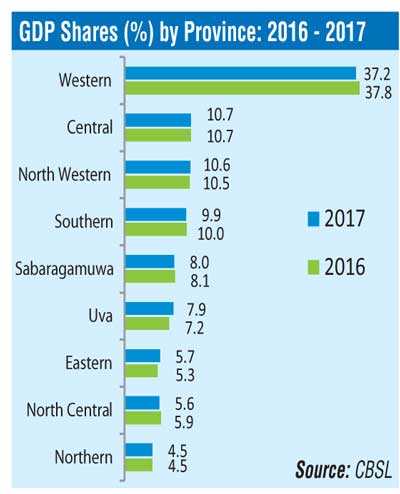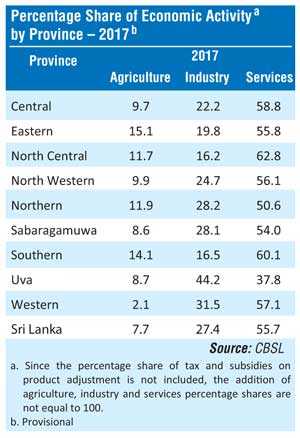Monday Feb 23, 2026
Monday Feb 23, 2026
Monday, 5 November 2018 01:19 - - {{hitsCtrl.values.hits}}
Three relatively poorer provinces, Uva, East and Wayamba, had increased their share of the country’s Gross Domestic Product (GDP) last year whilst that of the rest of the country either shrank or remained stagnant.
As per the latest Provincial GDP data published by the Department of Census and Statistics and released by the Central Bank on Friday, the Uva Province’s share of GDP increased to 7.9% from 7.2% in 2016, that of the Eastern Province improved from 5.3% to 5.7% and the North Western Province from 10.5% to 10.6%.
The share of the North Central Province declined from 5.9% to 5.6%, the Southern Province declined to 9.9% from 10% and Sabaragamuwa Province from 8.1% to 8%. Continuing the trend, the dominant Western Province share declined from 37.8% to 37.2%. Northern Province share remained unchanged at 4.5% whilst it was the same for the Central Province at 10.7%.
The Central and North Western provinces were the second and third highest contributors to the national GDP in nominal terms.
The shrinking of Western Province GDP confirms continuity in the narrowing of regional disparity.
Analysis of the economic structures within the province shows that services activities play a dominant role in each province, contributing more than 50% to the PGDP, except for the Uva Province where the contribution from the services sector was 37.8%. The performance of the services activities in each province was largely backed by the developments in wholesale and retail trade together with expansion in transportation activities.
Provincial GDP of the Uva Province was largely driven by industry activities (44.2%), to which mining and quarrying contributed significantly. In other provinces, the contributions from industry activities to PGDP varied from 16.2% to 31.5%.
In line with the trend observed in national GDP, contribution from agriculture activities to PGDP was the lowest in all the provinces ranging from 2.1-15.1%. During 2017, the Eastern Province recorded the highest share of 15.1%, which was led by the production of rice and marine fishing.
